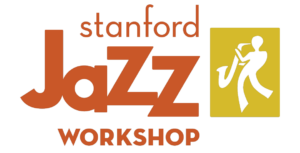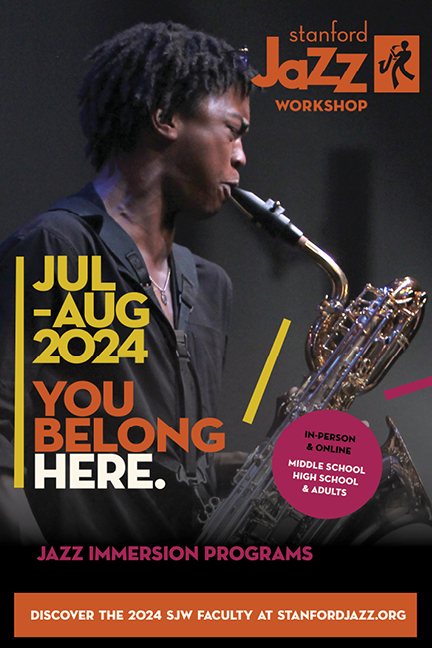Dianne Reeves with Quintet and Orchestra & SJW 50th Anniversary Band
7:30 p.m. Saturday July 30, Frost Amphitheater
Co-presented with Stanford Live.
Sponsored by Nicola Miner and Robert Mailer Anderson and the Stanford Jazz Workshop Board of Directors
Dianne Reeves is no novice when it comes to celebrating grand occasions. When the Los Angeles Philharmonic wanted to open the fantastical new Walt Disney Concert Hall with a bang, Reeves got the gig. In 2018, she was one of the youngest musicians ever awarded the National Endowment for the Arts Jazz Masters fellowship, and she stepped in to host the NEA concert celebrating the 2022 honorees at the SFJAZZ Center in March. “We kind of celebrate each other on and off stage all the time,” said Reeves, who has won five “Best Vocal Jazz Album” Grammy Awards. “That’s part of passing down this torch, offering respect and love and admiration, and it’s a joy for me to do that.”
Her gift for filling even the largest venues with a palpable sense of love is one reason that Reeves makes perfect sense to headline the concert concluding a celebration of the Stanford Jazz Workshop’s 50th year. A singer and songwriter whose sumptuously rich voice is matched by her skill at imbuing songs with her bountiful spirit, Reeves performs with her longtime quintet and an orchestra conducted by six-time Grammy Award–winning arranger Vince Mendoza, who’s collaborated with jazz and pop icons such as Joni Mitchell, Björk, Michael Brecker, Burt Bacharach, and Elvis Costello.
Reeves and Mendoza have worked together widely over the last three decades, but many of their performances have taken place in Europe with ensembles such as the Dutch Metropole Orkest and Germany’s WDR Big Band. Mendoza loves crafting arrangements for Reeves (“of course her instrument is magnificent, with her sound and power and huge dynamic range,” he said), but what’s most exciting for him is that she turns each piece into a captivating narrative. “The best singers are the ones that make you understand what the story is about,” Mendoza said.
For this rare stateside performance they’re drawing on a wide array of arrangements, including songs commissioned by Germany’s Jazz Baltica festival and pieces from her early albums. She’s also performing backed only by her longtime quintet, a stellar ensemble featuring SJW’s own Taylor Eigsti, who is filling in for music director Peter Martin; bassist Rueben Rogers; drummer Terreon Gulley; and Rio de Janeiro–born guitar master Romero Lubambo. “We can finish each other’s sentences,” Reeves said. “It’s a good feeling when you have a band like that.”
An all-star double bill, tonight’s concert opens with the SJW 50th Anniversary Band, a sextet that embodies the vast impact made by the Workshop over the decades. Featuring six of the 21st Century’s defining jazz artists playing together in this format for the first time, the band is built on a cadre of players who were profoundly shaped by their teenage experiences at the SJW. Berkeley High alumni Ambrose Akinmusire and Joshua Redman (the latter of whom plays on Mendoza’s latest album, Freedom Over Everything), have both spoken often about the inspiration they drew from their time at the Workshop, while Burlingame-reared Larry Grenadier was such a standout at SJW that veteran masters like Joe Henderson started hiring him for gigs.
Los Altos–raised pianist Taylor Eigsti wasn’t even a teenager yet when he started attending the Workshop in 1996, holding his own with older students like Akinmusire, Dana Leong, Thomas Pridgen, and Charles Altura (who’s now a bandmate of Eigsti’s in Terence Blanchard E-Collective). The pianist has been back every summer since, “and more than half of the people I work closely with I can trace directly back to Stanford,” he said. “It’s such a community. What’s been so amazing is starting as a student and then becoming faculty, and having the opportunity to play with so many great musicians. There’s a camaraderie to the faculty that’s unique to Stanford Jazz.”
Eigsti speaks for just about all the SJW musicians in crediting Workshop founder and director Jim Nadel with fostering an environment in which information passes directly from generation to generation. “When Jim was just starting out, he wanted some younger players and some older players,” says Eigsti. “The Workshop has always embraced that cycle. It’s where I learned how to teach and found role models that showed me how to express and articulate ideas.”
Drummer extraordinaire Eric Harland, a product of Houston’s creatively charged jazz scene, also has deep ties to the Workshop. A generational talent who’s contributed to some 200 albums, Harland has performed at the festival in numerous settings and has become a treasured presence on faculty.
No artist better embodies the organization’s expansive reach than Cuban saxophonist and percussionist Yosvany Terry. Raised in a celebrated musical family from Camagüey, he was a budding force on the Cuban jazz scene when he met Portola Valley saxophonist Bob Murphy at the 1994 Havana Jazz Festival. A founding member of the Workshop, Murphy had been on the lookout for talented young Cuban musicians interested in joining the SJW faculty. Terry jumped at the opportunity and the following year made his US debut at the Festival, a connection he’s maintained ever since. Now ensconced at Harvard University as director of the jazz ensembles in the department of music, Terry credits the Workshop as “the first place that gave me the opportunity to come to the US and be in touch with elders and legends. Everything I’ve achieved little by little is in connection with them.”
Jim Nadel, the Workshop’s founder and guiding spirit, assembled the sextet “from our alumni for this occasion,” he said. “I watched them as they grew as jazz artists. They’ve all returned to teach and are all bandleaders and composers making a major impact on the international jazz scene.”
Nothing better captures the Workshop’s ethos than having the most successful alumni come back year after year to start the cycle all over again. The SJW 50th Anniversary Band represents the way that the Workshop has come to perpetuate itself and renew the tradition, and it’s not hard to imagine that some of the students whose lives were changed this summer will be amongst the esteemed faculty when SJW celebrates its centennial.



